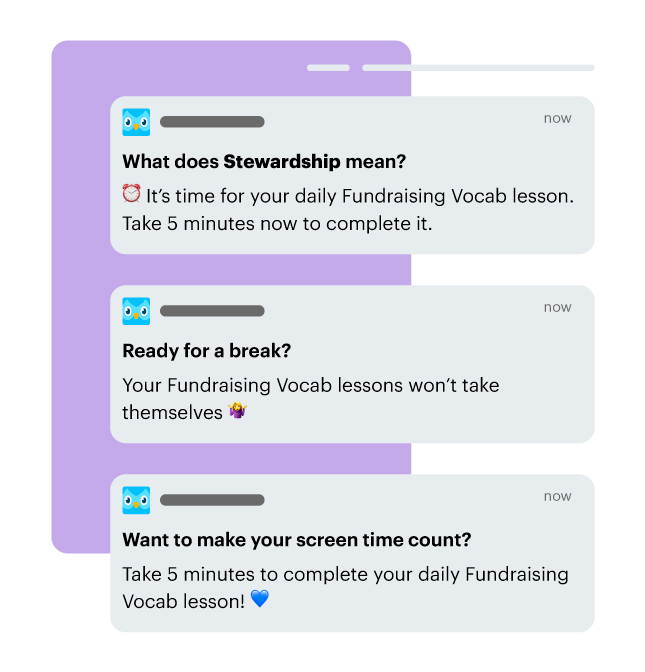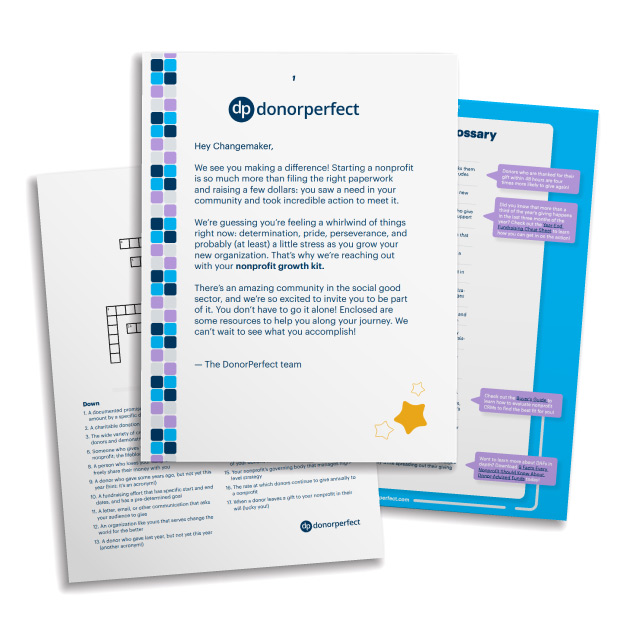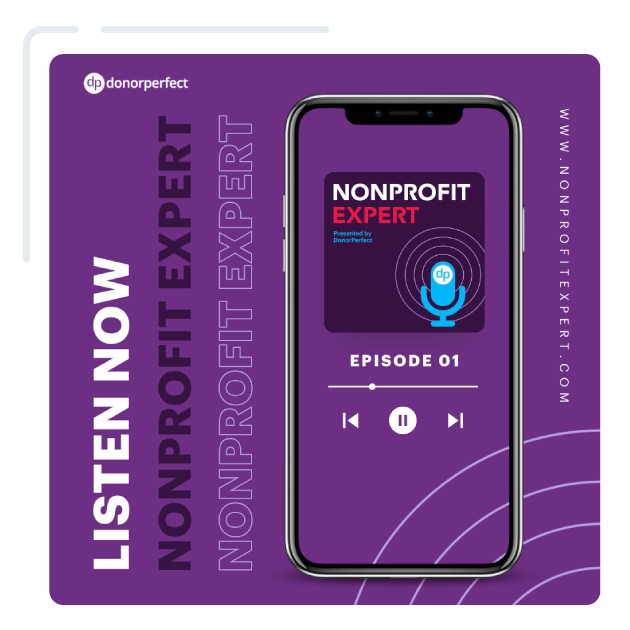Nonprofit Technology & Fundraising Blog
Subscribe to our mailing list

September 20, 2023 | Donor Retention, Fundraising Operations, Thanking Donors
Starting a new job, especially your first job in the nonprofit sphere, can often feel like you’re learning a new language on top of the new skills, new processes, new technologies, and new donor relationships you’ll need to learn to thrive. There’s a ton of information coming at you from all directions, and if you aren’t comfortable with the jargon, it’s easy to feel confused, overwhelmed, and frustrated.

If this sounds like you, don’t panic! We’ve put together some tips and resources for navigating and eventually learning the alphabet soup of the nonprofit sector. If you’re just starting your first fundraising job, and if you’re like me and the Duolingo owl haunts your nightmares with guilt-inducing reminders to get back to your Spanish (or Polish, or Hebrew…) lessons, we have your back.
Have you ever sat in a meeting and had no idea what your colleague was going on about with LYBUNTs, capital campaigns, annual giving metrics, DAFs, or soft credits? While I’m never one to discourage asking questions, I also understand the feeling of not knowing what every other word said in a meeting means, and not wanting to interrupt with a question every five seconds and disrupt the flow of the conversation.
When this happens, just jot the word down in a spreadsheet or other easily shareable format to keep a running list. You can use it just for yourself, or share with anyone joining your nonprofit as a new hire. When I was a fundraiser and switched to a subsector that I wasn’t familiar with, I kept a Google Sheet of unfamiliar words and terms, and asked my colleagues to add to it. They responded enthusiastically, and it turned out that a lot of us went through meetings feeling confused and overwhelmed by our own terminology!
Users can add words they’re unfamiliar with and leave the definitions blank, and more experienced users can fill in definitions and meanings of acronyms and other jargon that’s specific to your nonprofit. It’s a quick and easy way to share knowledge and create a common vocabulary among your team.

Want a head start on your glossary? Here’s a sample of our essential nonprofit sector terms and definitions, with more included in the free Nonprofit Growth Kit. Request your kit today!
| Term | Meaning |
|---|---|
| Acknowledgement | A letter or email to a donor that thanks them for their donation and frequently includes their tax receipt |
| CRM | Constituent Relationship Management or Customer Relationship Management system. Refers to the technology used to track and manage relationships with donors, volunteers, prospects, and others involved in a nonprofit’s success |
| Gift | A donation to a nonprofit |
| Lapsed donors | Donors who have previously given but have not made a gift in a specified period of time |
| Nonprofit | An organization that is tax-exempt and serves to better its community |
| Recurring donation | Scheduled donation, typically monthly, that is automatically charged to a donor’s credit card |
| Stewardship | Efforts and activities that occur after a donor has made a gift, including thanking the donor, using the gift according to the donor’s intentions, and keeping the donor informed of how their gift has made a difference |
Take a little inspiration from language-learning apps and make your process more fun and engaging than just staring at your glossary and willing yourself to memorize it. In the Nonprofit Growth Kit, we turned the glossary into a crossword puzzle to help give your brain another way of interacting with – and learning – the terms and phrases you’ll need in your daily life as a fundraiser.
Other ways to gamify your learning can include setting yourself daily challenges, like working in a few new words in your next meeting, explaining your new vocabulary words to your dog or toddler, or exploring Wikipedia for words and concepts in your role that are new to you.
While you won’t grasp everything immediately, try attending nonprofit-focused webinars, auditing classes, and listening to podcasts to enhance your overall nonprofit education. Repeated exposure to new vocabulary words in the right context will help you internalize their meanings and give you better insight into why some jargon is necessary.
Your local community colleges and libraries are a great place to start, and many offer fundraising 101-style courses. If you’re not planning on getting a certification or degree, there’s even a chance you can audit these courses for free!

Looking for a podcast that will enhance your nonprofit industry knowledge? Check out Nonprofit Expert, the podcast presented by DonorPerfect!
This may sound silly, but it works: as you notice yourself learning new words, adjusting to your nonprofit’s unique jargon, and generally feeling more comfortable in your environment, give yourself a little treat. By “hacking” your brain’s reward system, you’re setting yourself up for future learning success, since you’re building an active connection between learning the essential language for your job and a nice hit of the feel-good chemical dopamine.
I like to keep small treats on hand, like individually wrapped chocolates, for whenever I need to remind my brain that when it learns the things I need to know, it’s doing a good job. You could use treats like a quick break outside, a happy hour at the end of the week, or any other activity that makes you feel good. It’s a great trick for motivating yourself through tedious tasks, too!
While it is sometimes necessary to use jargon to get your job done, try to not let it bog you down too much, especially when working with your donors or board members. Make sure you understand your mission, values, and fundraising strategy well enough that you can explain it clearly and succinctly to someone who has never interacted with your nonprofit before, and then you can pepper in jargon and specific vocabulary as needed.
Whether you’re a first-time fundraiser, are gearing up to start your own nonprofit organization, or just want to learn more about the nonprofit sector generally, the DonorPerfect team is here to help. Get your free Nonprofit Growth Kit today to jumpstart your learning and get you feeling confident and ready to raise the money your mission deserves.
Follow us on social!